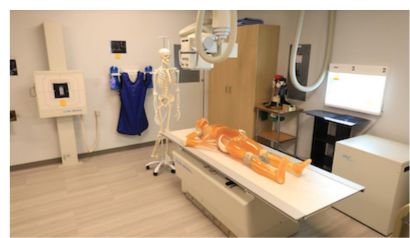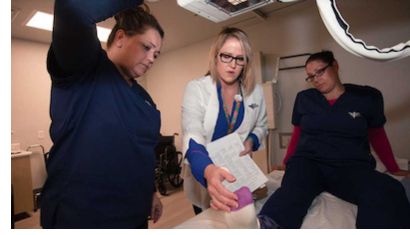
Pima Medical Institute: Student Safety is Top of Mind
Pima Medical Institute (PMI) is a nationally accredited, employee-owned, private medical career college focused wholly on healthcare careers. From a single campus in 1972, PMI now has 30 programs offered at 17 campuses in eight states in the southwestern United States and a robust online learning option. Since its opening, more than 150,000 graduates have pursued careers in respiratory therapy, nursing, radiography, dental hygiene, medical assisting, physical therapy assistant, occupational therapy assistant, the veterinary sciences, and more. PMI is committed to providing the best value in medical career education.
PMI Radiography Programs
 One of the most popular programs at PMI is Radiography; it is offered as an in-person Associate degree, online Associate Bridge, or an online B.S. in Radiologic Sciences. Radiologic technologists today have an increasingly important role within a medical team. They perform diagnostic medical imaging examinations that assist physicians in diagnosing and treating disease. Students in the PMI Radiography program are taught by expert instructors who give them a solid foundation to work as radiologic technologists, including examination techniques, equipment protocols, radiation safety, and radiation protection.
One of the most popular programs at PMI is Radiography; it is offered as an in-person Associate degree, online Associate Bridge, or an online B.S. in Radiologic Sciences. Radiologic technologists today have an increasingly important role within a medical team. They perform diagnostic medical imaging examinations that assist physicians in diagnosing and treating disease. Students in the PMI Radiography program are taught by expert instructors who give them a solid foundation to work as radiologic technologists, including examination techniques, equipment protocols, radiation safety, and radiation protection.
Donna Steele, based in Tucson, is the Clinical Director for the Radiology Bridge Program. Her impressive credentials include an M. Ed in adult education, a bachelor’s degree in Health Care Administration, an Associate Degree in Radiologic Technology, and Radiologic Technologist certification. Her background includes 15 years as an expert staff technologist and then as a Chief Technologist at Christus Santa Rosa. After working as a Chief Technologist, she moved from the clinical environment to education when she was offered the opportunity to be full-time faculty for a two-year Radiology Program at the local community college in San Antonio, Texas.  While there, she served as Faculty, later becoming Assistant to the Clinical Coordinator and later promoted to Program Director. After more than 30 years in San Antonio, Donna relocated to AZ to serve as the leader of both the X-ray and dental departments for the Bryman School, one of the Florida Career Colleges campuses in Northern Phoenix. From there, she became the Student Services and Faculty Coordinator for one of PMI’s on-ground campuses. When the position of Clinical Director of the online radiology program became available, she leaped on it. Donna has served as a key contributor to the growth of the Radiography Bridge Program.
While there, she served as Faculty, later becoming Assistant to the Clinical Coordinator and later promoted to Program Director. After more than 30 years in San Antonio, Donna relocated to AZ to serve as the leader of both the X-ray and dental departments for the Bryman School, one of the Florida Career Colleges campuses in Northern Phoenix. From there, she became the Student Services and Faculty Coordinator for one of PMI’s on-ground campuses. When the position of Clinical Director of the online radiology program became available, she leaped on it. Donna has served as a key contributor to the growth of the Radiography Bridge Program.
As the Clinical Director of the online program, she is both a faculty member and manager of the externship program, where students participate in externships after completing their course work. At medical facilities across the U.S., they get hands-on training with Imaging equipment in a real-world setting and gain confidence in performing well when hired for a full-time job.
Donna works with her students when they apply for an externship to ensure that all the externship requirements are met, including immunization history, drug screening, background checks, and any specific documentation or other conditions established by the facilities offering the externships. Except for California, hospitals throughout the country work with Donna through the NC-SARA agreement. NC-SARA is the nationwide consortium of states cooperating with each other to set up student clinical experiences in hospital radiology departments. California does not participate in NC-SARA, so even though many of the online students reside in California, they have to go to other states for the externships. The program gets about 150 students a year with three starts. As a result, Donna works with approximately 50 students at a time to get them externships.
The focus of the externships is to give students in-depth training in X-ray so that they can demonstrate competency to pass the 61 American Registry of Radiologic Technologists (ARRT) imaging competencies and be eligible to sit for the ARRT exam. While their primary focus is on X-ray, if they have completed their competencies, they are usually welcome to shadow a technologist to learn more about CT, MRI, and other more advanced radiology modalities.
Radiation Safety at PMI
 Dosimetry is a vital part of the externship equipment. The online radiology program at PMI differs from a medical facility that assigns dosimeters to staff or even a classroom situation where the badges could be handed out for a class then returned and reused. Because the externships are only seven weeks long, Landauer provides the Luxel® dosimeter and control badge to clinical students on a one-time-only basis. The students are provided the badges by PMI, not the facility where their externship take place.
Dosimetry is a vital part of the externship equipment. The online radiology program at PMI differs from a medical facility that assigns dosimeters to staff or even a classroom situation where the badges could be handed out for a class then returned and reused. Because the externships are only seven weeks long, Landauer provides the Luxel® dosimeter and control badge to clinical students on a one-time-only basis. The students are provided the badges by PMI, not the facility where their externship take place.
Donna sends a list of student names, mailing addresses, and other important data to Landauer which, in turn, sends the dosimeters directly to the students. The student is then responsible for mailing the dosimeter back to Landauer at the end of the externship. Students are expected to be professional and return the dosimeters.
Donna said, “We have such a unique program because we don’t have students in a classroom. Because I don’t have to return and reassign badges, the current plan works very well with the one-time-only use. We do not have to manage a quarterly fee, exchanges, or swapping out badges.”
The biggest challenge Donna faces is to make sure the students do indeed return the dosimeter. She gets a list of returned badges from Landauer, and she follows up with students who still need to return their badge. After the dosimeter is returned, Donna sends the dosage report via email to the student, who can then provide a cumulative dosage history to the RSO or hiring manager when they start working at a medical facility. PMI also has a student portal where Donna uploads the report so the student can access the information when needed. Finally, PMI closes the loop by having students sign and date the dosage report to acknowledge they received it. They can then upload it to their clinical course records.
PMI and Landauer
PMI has used Landauer Luxel dosimeters for years, and Donna has personally used Landauer dosimeters for decades, close to the entirety of her career. So, when she joined the PMI online division in 2016, the decision to continue using Landauer was a simple one.
“I would highly recommend Landauer,” she states. “They have made big improvements in the last two years, and the new customer portal is so much easier to use.”
PMI’s online radiology program orders approximately 150 one-time-use dosimeters a year. Donna arranges externships 3x a year, and each group has around 50 students. It’s very efficient to have the students mail the dosimeters back to Landauer, and when the next batch is needed, Donna sends a new list to Landauer, who, in turn, mails new badges to the latest list of individuals.
Donna replied thoughtfully when asked how she would advise someone about using Landauer dosimeters. She said that before giving any advice, she would ask several questions, such as what type of organization needs the dosimeters (hospital, education, etc.), whether it is a large or small department, and what kind of personnel drives the need for dosimeters. She would also suggest that the customer thinks about what the exchange process would look like, how many people would be monitored, what the cost breakdown would be, and would they be monitoring people who don’t get a lot of radiation exposure.
“Landauer is a trusted supplier and resource to discuss these questions with and provide the kind of service a new customer requires for their dosimetry program.”
Radiology students at PMI receive an excellent education and background for a successful career as radiologic technologists. With her education, experience, and knowledge of the technology, they are also fortunate to have Donna Steele helping them navigate their future.
